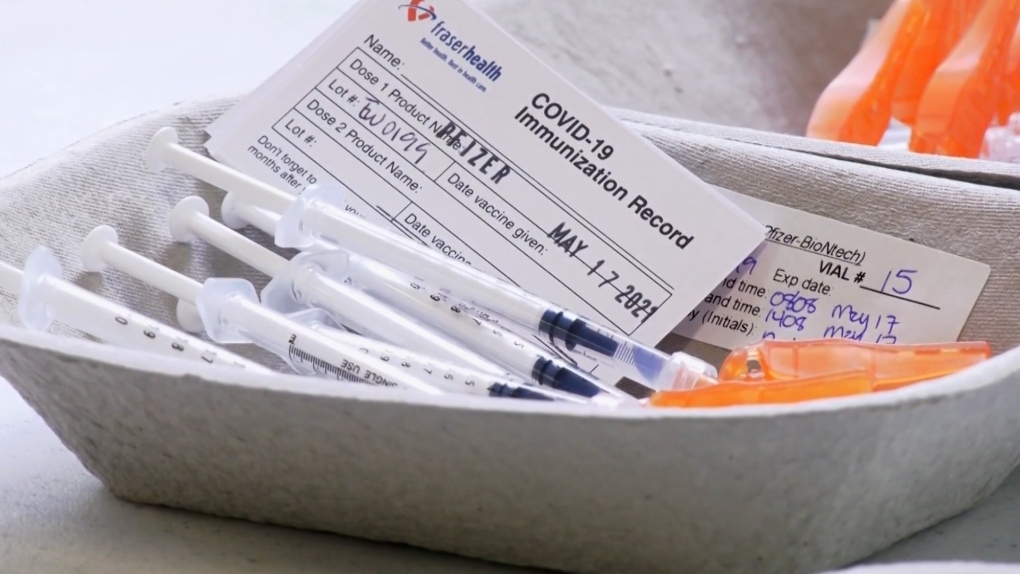Firing of B.C. health worker who refused COVID-19 vaccine upheld at arbitration
 A tray of COVID-19 vaccines are seen at an immunization clinic run by the Fraser Health Authority.
A tray of COVID-19 vaccines are seen at an immunization clinic run by the Fraser Health Authority.
A health-care worker fired after confirming she had "absolutely" no intention of complying with B.C.'s COVID-19 vaccine mandate has lost a grievance against her former employer.
In a decision this week, a labour arbitrator found Lori Capozzi's steadfast refusal to get vaccinated, despite a provincial order requiring all public health workers to do so, had left Fraser Health with few options but to terminate her employment.
"Clearly, the grievor has the right to make her personal choices, and I accept she strongly believes in her views," arbitrator Koml Kandola wrote.
"However, the result of those choices was that she rendered herself, by virtue of the terms of the order, ineligible to work."
Capozzi had been a substance abuse counsellor for the health authority for seven years when B.C. began mandating vaccination for health-care workers last summer.
The requirement initially only applied to employees in long-term care homes and assisted living facilities, but was soon expanded to include everyone working under the province's six health authorities.
Kandola noted B.C.'s public health order does not require employers to fire unvaccinated workers, and Capozzi's union suggested she could have remained on unpaid leave instead.
But Fraser Health disagreed, arguing that firing the 460 of its employees who refused vaccination was the only reasonable course of action.
Ken Casorso, executive director of people services for the health authority, told the arbitrator keeping unvaccinated employees on leave for unspecified periods of time would have forced Fraser Health to fill their shifts with temporary contracts – a difficult proposition he said would likely to lead to "a lot of staff churn."
The arbitrator heard temporary positions are "considered undesirable and difficult to fill, with temporary shifts lacking an end date as amongst the least attractive."
"This evidence was not persuasively challenged by the union," Kandola wrote.
In her decision, the arbitrator stressed the grievance was not about the validity of B.C.'s public health order, or the merits of vaccination. Rather, it was about whether Fraser Health had reasonable cause to fire Capozzi given the existence of a province-wide mandate that impacted her ability to do her job.
The order has no expiry date, and Kandola quoted from a Nov. 1, 2021, news conference in which provincial health officer Dr. Bonnie Henry said the vaccination requirement "is not just for getting through this wave right now, it's for that longer-term protection as we learn to live with this virus over time."
“If people are in our health-care system and not recognizing the importance of vaccination, then this is probably not the right profession for them, to be frank," Henry said.
There are exemptions available to health workers who can't get vaccinated for medical reasons, but not for those who refuse on religious grounds. Capozzi said her opposition to vaccination was based on religion, rendering her ineligible for an exemption, according to the decision.
The substance abuse counsellor's position has since been filled, and she has been counselling clients through her own business.
Kandola acknowledged getting fired has been "very difficult" for Capozzi, but noted that Fraser Health gave her ample notice about the consequences of her decision, and provided multiple opportunities to receive her shots.
"She confirmed she was not and did not ever intend to become vaccinated," the arbitrator wrote.
"Simply put, there was no path forward for the grievor for continued employment."
CTVNews.ca Top Stories

Heavy snow, freezing rain warnings hit parts of Canada, expected to last throughout Monday
Significant snowfall and heavy rain hit parts of Canada on Sunday and the weather system is expected to continue into Monday morning and throughout the day.
The Canada Post strike involving more than 55,000 has hit 25 days
The Canada Post strike involving more than 55,000 workers has hit 25 days.
Most Canadians view illegal immigrant border crossings as concern for U.S.: Nanos survey
More than 80 per cent of Canadians believe the flow of illegal immigrants from Canada to the U.S. is a concern, according to a new survey.
Government faces third Tory non-confidence vote ahead of potential fiscal hurdle
The Liberals are set to face a third Conservative non-confidence vote today, but the government is likely to survive with the support of the NDP.
Jay-Z accused of sexually assaulting 13-year-old in 2000 incident along with Sean 'Diddy' Combs
A woman who alleges she was sexually assaulted by Sean 'Diddy' Combs has amended her lawsuit to include allegations that she was also assaulted by Jay-Z at the same party.
Suspect wanted after victim forcibly confined, assaulted, and threatened with death in Scarborough
Police have released images of an individual who allegedly forcibly confined, and assaulted and threatened to kill another person in southwest Scarborough over the weekend.
Taylor Swift ends record-smashing Eras Tour in Vancouver, after glittering global run
Taylor Swift took the stage for the final time on her record-smashing Eras Tour, watched by tens of thousands of delirious fans in Vancouver's BC Place arena and by millions on livestreams around the world.
Who is Abu Mohammed al-Golani, the leader of the insurgency that toppled Syria's Assad?
Abu Mohammed al-Golani, the militant leader of the insurgency in Syria, has spent years working to remake his public image, renouncing to ties to al-Qaida.
Some cancer patients may forgo care due to high treatment-related costs: report
A Canadian Cancer Society report, published Monday in partnership with Statistics Canada and the Public Health Agency of Canada with analysis by Canadian Partnership Against Cancer, estimates a cancer patient will face almost $33,000 on average in out-of-pocket cancer-related costs in their lifetime, including loss of income.






























